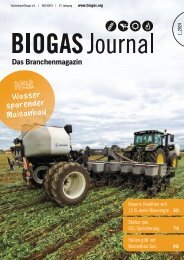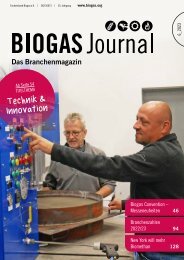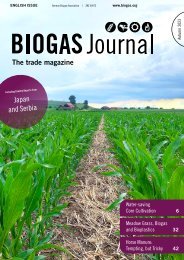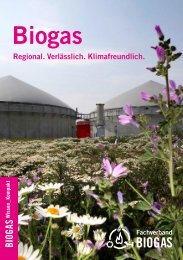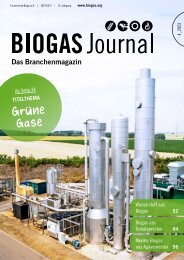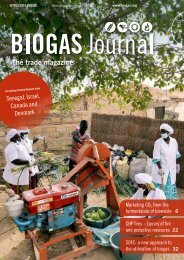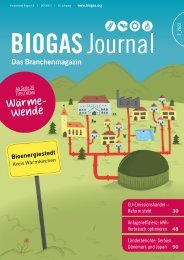You also want an ePaper? Increase the reach of your titles
YUMPU automatically turns print PDFs into web optimized ePapers that Google loves.
Significance of waste digestion in developing countries<br />
10 Significance of waste digestion<br />
in developing countries<br />
In developing countries and emerging economies, biogas technology can<br />
play an important role in integrated waste and recourse management. Anaerobic<br />
digestion of organic waste provides a unique opportunity <strong>to</strong> tackle<br />
waste management problems, reduce environmental pollution, provide<br />
green energy, and <strong>to</strong> close the nutrient cycles.<br />
<strong>Biowaste</strong> collection for<br />
biological treatment<br />
Inadequate solid waste management in urban centres<br />
of low- and middle-income countries is a serious environmental<br />
and health problem. Rapid urban population<br />
growth and the continual increase in waste generation<br />
intensifies the challenge. Often, more than 50 %,<br />
sometimes up <strong>to</strong> 70–80 %, of waste produced is organic<br />
and biodegradable. Suitable treatment options<br />
for the large organic fraction could help alleviate the<br />
waste problem. At the same time, the worldwide drive<br />
<strong>to</strong> find clean, renewable energy sources remains a main<br />
priority. Countries are keen <strong>to</strong> cut their reliance on fossil<br />
fuels due <strong>to</strong> concerns over the security of supplies and<br />
<strong>to</strong> provide alternatives <strong>to</strong> wood fuel, the main energy<br />
source for cooking and heating which is causing severe<br />
deforestation. Banning the dumping or landfilling of organic<br />
waste is therefore of great benefit: it reduces the<br />
generation of landfill gas, relieves pressure on scarce<br />
landfill capacities and mitigates all of the conflicts,<br />
costs and social burdens involved.<br />
Anaerobic digestion of organic waste, resulting in the<br />
generation of biogas and digestate, which is a high caloric<br />
organic fertilizer, provides a unique opportunity<br />
<strong>to</strong> fulfil a number of objectives: tackling waste management<br />
problems, reducing environmental pollution,<br />
supporting energy recovery and closing the nutrient cycle.<br />
There is no need for purpose-grown crops (“energy<br />
crops”) for fuel as organic waste supply is abundant.<br />
This approach contributes <strong>to</strong> improved waste management<br />
practices and, at the same time, fulfils the goals<br />
of sustainable energy generation. Furthermore, using<br />
waste biomass <strong>to</strong> produce biogas creates a carbon-neutral<br />
cycle, in which the carbon emitted from burning<br />
the gas is absorbed by new crops from which the waste<br />
residues can again be used as feeds<strong>to</strong>ck: Anaerobic<br />
biowaste digestion and the energetic use of biogas is<br />
helping <strong>to</strong> reduce GHG emissions directly, by reducing<br />
uncontrolled CH 4<br />
emissions from e.g. landfills and<br />
informal dump sites, and indirectly by replacing the use<br />
of fossil fuels. Let’s keep this in mind: CH 4<br />
emissions<br />
caused by human activities are the second largest drivers<br />
of climate change after CO 2<br />
.<br />
<strong>Biogas</strong> waste treatment facilities reduce the amount of<br />
waste disposed in uncontrolled dumping sites, which, if<br />
unmanaged, release pollutants in<strong>to</strong> air, water and soil,<br />
endangering the environment and contributing <strong>to</strong> GHG<br />
emissions. Digestate from biogas facilities is a valuable<br />
fertilizer for farmers and is particularly useful in countries<br />
where soil quality is naturally poor (thin humus layer<br />
and organic content) or has become degraded through<br />
over-intensive farming and the use of artificial fertilizers.<br />
28









